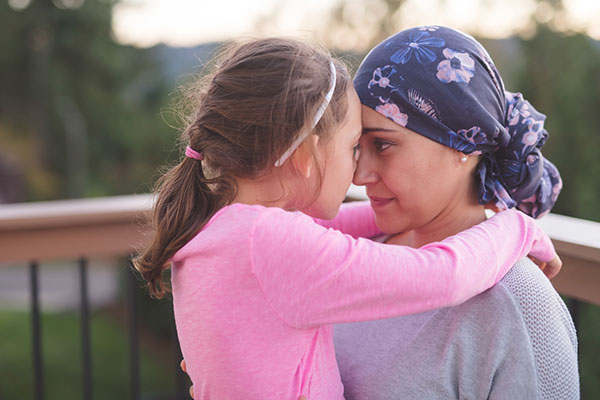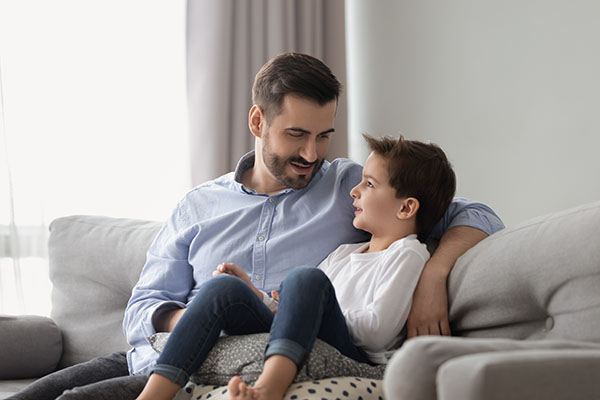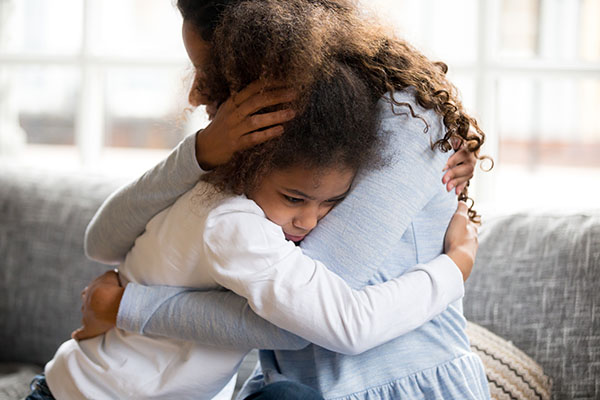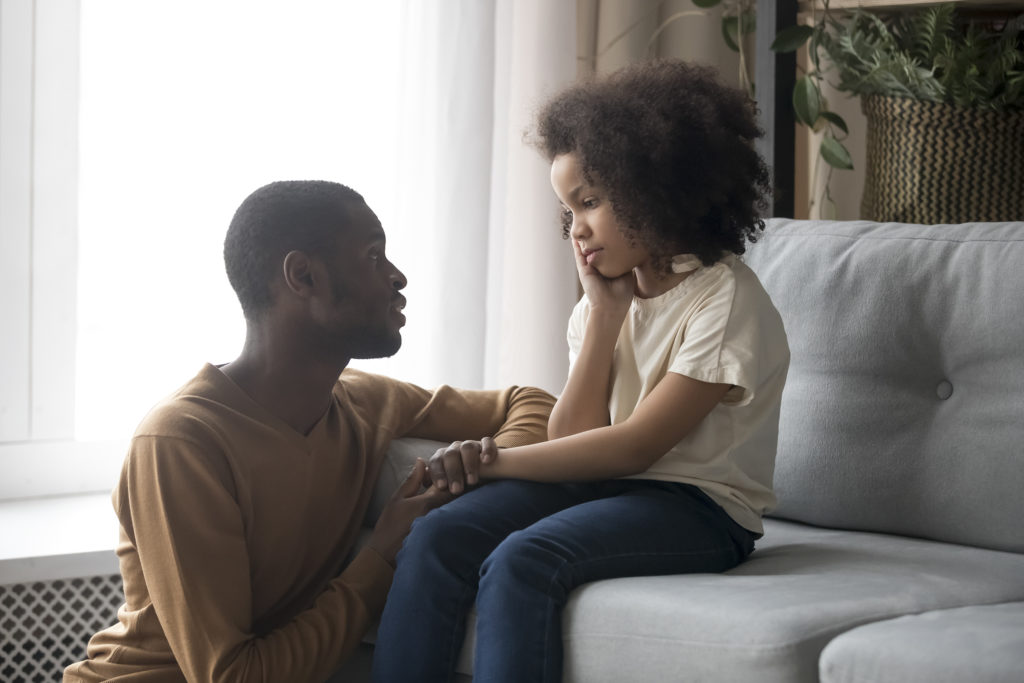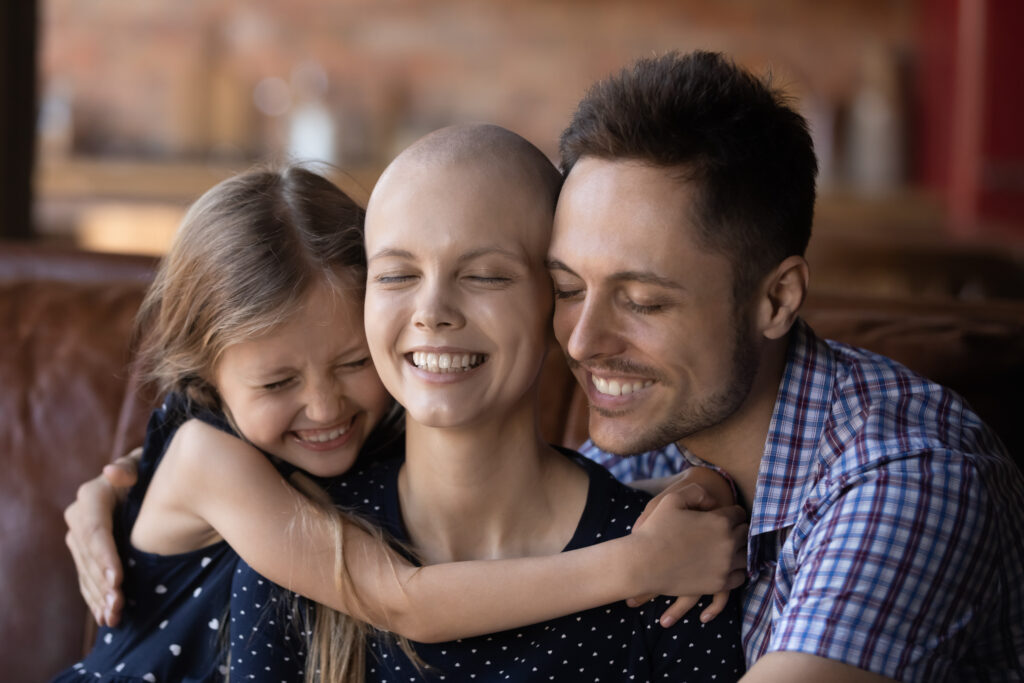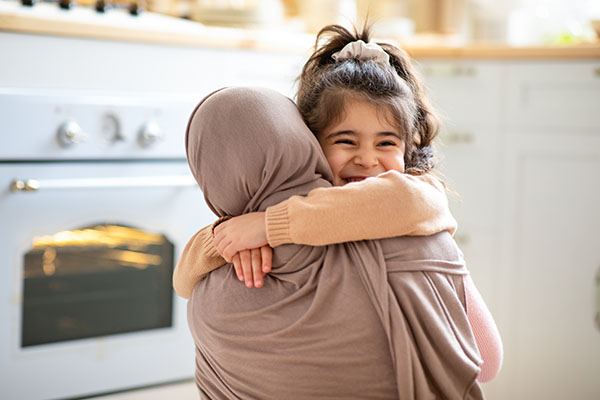After a brain tumor diagnosis, parents often face a daunting question – “How do I tell my kids?”
You may worry about saying the wrong thing, overwhelming them, or not having all the answers. While this conversation is undeniably difficult, it’s also an important one.
Children, regardless of age, can sense when something is wrong at home. Without honest communication, they may fill in the gaps with their imagination — often making the situation feel even scarier. The good news? You don’t have to do it all at once. Talking to kids about a brain tumor — whether it’s yours or a loved one’s — is an ongoing process, best approached through open, honest, and age-appropriate conversations.
“It’s not a one-and-done conversation,” said Kelsey Mora, Chief Clinical Officer of Pickles Group, a nonprofit that provides free peer-to-peer support to kids and teens impacted by their parent’s or guardian’s cancer. “It’s really about taking this larger concept and breaking it into mini conversations along the way.”
For the purpose of this post, the term “parent” represents any parent or guardian responsible for the care of a child.
Talking to Kids About a Brain Tumor Diagnosis
You may feel that withholding information from your kids is protecting them from what is happening, but children of all ages can sense when something feels different at home. They might be unable to pinpoint the cause, but they may feel unsettled and anxious about the changes they perceive.
“My kids are very in tune with our feelings,” said Alexandra B., who was diagnosed with oligodendroglioma. “I knew we had to tell them because they would know something was up even if we weren’t saying anything. They often figure things out, and their imagination can make it worse. My husband and I took the time to talk to each child separately. We explained what a tumor was and reassured them that they weren’t to blame for any of this. We made sure to explain that this was just bad luck.”
Otherwise, children may use their imagination to try filling in the pieces when they sense something is wrong.
“As parents, protecting our children from any kind of emotional pain can be an immediate response when something difficult has occurred, including the diagnosis of a brain tumor,” said Holly G., whose husband had glioblastoma. “We think they won’t notice what is happening, but in reality, children of all ages are intuitive and sense when there is a change or something is wrong. When we don’t tell them as much of the truth as possible, keeping in mind the age of the child, they begin to make up stories, which can be pretty scary.”
Kelsey recommends age-appropriate language, honesty, and reassurance.
“A lot of parents just don’t know what to say — how much to say and how to explain it,” Kelsey said of parents talking to their child(ren) about a brain tumor. “Just because we’re not talking about it doesn’t mean kids aren’t thinking or worrying about it. Providing kids with honest information can actually provide them with a sense of relief. They don’t have to be detectives and make sense of things on their own when they’re seeing visible changes like an Optune device, a surgical intervention that comes with an incision or a bandage, or altered behaviors from brain tumors.”
Having big conversations doesn’t always have to happen face-to-face at the dinner table. Consider bringing up difficult topics during a neutral time and environment, such as while on a walk or while doing an activity together. These settings can help children feel more at ease, as they don’t have to maintain direct eye contact and may find it easier to process emotions and ask questions in a more relaxed but not rushed environment.
Use Age-Appropriate Language
When talking to kids about a brain tumor diagnosis, it’s important to tailor explanations based on their developmental stage. Younger children need simple, concrete language, while older kids may be ready for more detail.
If your child has a developmental disability, consider what they can comprehend and adjust to meet their needs. The book “I Have a Question About Cancer: Clear Answers for All Kids, Including Children with Autism Spectrum Disorder or Other Special Needs” may be particularly helpful.
Each child will process the news differently, and that’s OK. By meeting them at their level and offering space for questions and emotions, you can help them feel supported through the uncertainty.
Amanda P. shares how they told their kids after her husband’s glioblastoma diagnosis, “For the small children, it was, ‘Dad’s in the hospital. We’ll be home in a couple of days. We’ll continue checking in, and then we’ll talk to you at home.’ For the middle children, it was, ‘Dad’s in the hospital. He had seizures. They found something in his brain. We’re coming back to Wisconsin. You’re going to see him, you’ll be able to see what’s going on, and we’ll talk you through everything.’”
Toddler & Preschool Age
Young children (ages 2-5) have a limited understanding of illness and may not grasp the full meaning of a brain tumor. They are concrete thinkers who need simple, straightforward explanations without overwhelming details.
Example: “Remember how Mommy was having headaches? Well, they found a lump inside her brain. The doctors are trying to find out why it’s there and how to make it better.”
Children don’t need to know every detail at this age but it can help to clarify how it is similar and different from what’s familiar to them. When this age group thinks of sickness, they might think of a cold or flu so it’s important to help them understand that it’s a different kind of sickness and how it will impact them.
“We tried to tailor it to how it would impact my 4-year-old,” Amanda said. “What would he actually see? We didn’t want to give him more information than he could process anyway. What does the big cancer term mean to a 4-year-old? For our 4-year-old, what mattered was that Dad was going to have surgery. He’s going to have something on his head, and it’s going to look scarier than it is. We’re not going to be able to play rough with you.”
Even at a young age, an honest, age-appropriate explanation can make a world of difference.
“We recognize that those conversations are going to be really simple when kids are infants, toddlers, preschoolers, but cancer is often a long-term condition, sometimes chronic, and so kids will age and develop throughout their parent’s cancer,” Kelsey explained. “Starting these conversations young can give parents and caregivers something to build on as they age.”
School Age
Children in elementary and middle school (ages 6-13) have a greater ability to understand the disease but still think in concrete terms. Be mindful of your child’s individual development to tailor language appropriately.
Kelsey said, “This age group has increased understanding, but they also might have misinformation, so they may not feel comfortable asking hard questions if it’s not being modeled for them. If we don’t [talk to them about it], they may try to get information from a different source. They may ask their friends, they may ask the internet, they may ask someone who’s not familiar with their situation, and they might get information that doesn’t actually represent what the family is going through.”
With this age group, open the lines of communication and help them know this is an OK thing to talk about and ask questions. Reassure them that you’re going to navigate it together.
“For our 9-year-old to pre-teenage children, it was still very much focused on, ‘Here’s what we know, here’s what we’re doing, and here’s how you can help dad,” Amanda explained. “When we started doing Optune, we taught the kids how to change the arrays — adhesive patches that deliver Tumor Treating Fields therapy — to involve them in part of the process. They didn’t have to do it, but it helped them be aware of how we’re going through this as a family, and this is how we can all help support your dad through this.”
Kids this age might also worry about how the diagnosis affects them and their daily lives.
Example: “Dad went to the hospital because he was having trouble walking. They took some pictures of his brain and found a tumor, which is basically a clump of cells that aren’t supposed to be there. This can happen when the tumor is pushing on parts of the brain that help with walking and movement. A tumor is not something you can catch like a cold, and we’re still learning what we can do about it. We will update you when we have more information.”
Example: “Mom has a brain tumor, which means some of the cells in her brain aren’t working the way they should. The doctors are doing tests to figure out the best treatment, which might include surgery.”
“When we found out I was sick, and it was cancerous, we talked to Olivia,” said Megan D., who was diagnosed with grade 2 astrocytoma. “We told her I was sick, but I had good doctors, and they were going to help take care of me. We didn’t tell her anything about how bad cancer can be, except we explained to her that I was going to lose my hair, I was probably going to be really sick, and that, unfortunately, that’s just kind of what comes with it.”
High School Age
Teenagers (ages 14-18) are capable of understanding complex information and may want to know more details about the brain tumor, treatment, and prognosis.
Example: “Dad has been diagnosed with a brain tumor. It’s a growth in his brain that shouldn’t be there, and the doctors are working on a treatment plan. We don’t know all the details yet, but we’ll figure this out together. He might need surgery, treatments, and time to rest, but we’ll keep you updated as things progress.”
Teenagers may also be deeply concerned about how this will affect their family, responsibilities, and future.
“They might be thinking about the really big picture,” Kelsey said. “They might be thinking, ‘How does this affect me? What’s going to happen next?’ Teenagers are very egocentric, which means they’re focused on their lives. They’re busy, they’re studying, they’re making friends, they’re engaged in activities, and they may feel like their world has been really turned upside down. We want them to know that they can explore that, express that, and that you’ll figure it out together. Sure, there will be a lot of changes, but when they can talk about it, it makes it a little bit easier to navigate.”
Keep it Simple and Consistent
After a brain tumor diagnosis, it’s crucial to keep the conversation simple and consistent, tailoring the information to your child’s age and understanding. Avoid using complex medical terms and instead focus on being direct but gentle with your explanations. This approach will help prevent confusion and ensure that the message is clear.
“Sometimes parents get concerned about all of the details, which makes sense because, as a parent, you’re thinking about a lot of those details,” Kelsey said. “Kids may not be that far ahead yet, and they may need to just hear what’s happening right in front of them — what they’re seeing, what they’re observing, and how it is affecting them.”
Conversations should be short and clear, allowing space for questions. Remember, it’s OK to pause during the conversation and check in — sometimes, children need a break or may not want to continue the discussion. While honesty is essential, there’s no need to overwhelm them with too much information all at once. Share what’s happening, but do so in a way that answers their potential questions without causing unnecessary fear.
“I think it’s difficult to know how much information to share with your children,” said Pam*, who had girls in middle school at the time of her glioblastoma diagnosis. “You want to share, treat them respectfully, and not hide things from them, but you also don’t want to tell them too much that it causes them undue stress, so finding that balance between being honest and open and not creating more stress.”
It’s also helpful to keep the information shared by adults consistent, so they aren’t hearing different information between a parent and a grandparent, for example.
“We’re a blended family, so we obviously gave the other parent a heads up of what was going on and also shared what we were sharing in case they had questions,” Amanda shared. “And then we had active grandparents who helped support the conversations as well that we told them, ‘This is what we’re sharing, this is how we’re sharing it, and support us by not giving our children more information than you have.’”
Reassure Them
Regardless of your child’s age — whether a toddler or a high school student — reassuring the child they are loved and supported lets them know the family will face this challenge together.
Example: “No matter what, we love you, and you can always talk to us about how you feel.”
You can also let them know it’s OK to feel a variety of emotions at this time.
“It’s normal for kids to feel scared, feel sad, maybe even feel playful and happy,” Kelsey said. “Just normalizing and validating all those feelings can really help them.”
Children of all ages may feel anxious about changes in their family and their parent’s health. That’s why clear and consistent reassurance that they will receive updates along the way can help them feel more secure.
“I have been doing this for over 12 years and have worked with a lot of families,” Kelsey said. “Most kids feel more nervous by what they don’t understand. So when they know that it’s OK to talk about it, they end up talking about it less because they trust that their parents are going to update them when there are big changes. It just opens the lines of communication. When information is more matter of fact, kids tend to feel better.”
Encourage Questions
Encourage them to ask anything they’re curious or worried about, and reassure them that there are no “wrong” questions. Let them know that their thoughts and concerns are valid and that you will be there to talk when they need it.
Every child processes information differently, so their questions will vary. According to Pickles Group, children of all ages often have four common questions after learning about a parent’s diagnosis:
- Can I catch it?
This question is often asked by younger children, especially preschoolers or young elementary school students, who think of germs when they think of illness and are worried about getting sick themselves. - Did I cause it?
Many kids, particularly preschoolers, may wonder if something they did or said contributed to their parent’s illness. It’s important to reassure them that this is not the case. - Can I cure it?
Children often want to feel like they have control, and the question, “Can I cure it?” reflects that desire to fix what’s wrong. Acknowledge their feelings, but be clear that only medical treatments can help the parent. Example: “The doctors are working hard to get me the best medicine to get rid of my cancer or make it better.” - Who will take care of me?
This is an important question. Kids may worry about changes to their daily routine or who will be responsible for their care while a parent is undergoing treatment or not feeling well. Help them think about who is in their support system as well as communicate the plans and arrangements to take care of them.
Alexandra said, “It was tough, but my son’s first question was, ‘Well, what are you going to do about that?’ And I said to myself, ‘What am I going to do about that?’ It really stuck with me.”
It’s OK to Say “I Don’t Know”
If your child asks a question you don’t know the answer to, it’s perfectly fine to say, “I don’t know.” Kids value honesty, and by acknowledging uncertainty, you can show them that it’s OK not to have all the answers right away.
Kelsey said, “I also want to make sure parents know that ‘I don’t know’ is a real answer, and kids actually feel that that’s honest. When parents say, ‘You know, that’s a great question. I don’t know the answer to that right now. As soon as I do, we’ll talk about it.’ That can be reassuring, even if it feels hard as a parent to not be able to fix something or answer something.”
“Are You Going to Die?”
Kids may also wonder if their parent could die from a brain tumor.
Example: “I don’t know. We’re going to work as hard as possible to avoid that outcome. There’s going to be a lot of steps to try to get me better, and we’re going to do our best to create lots of memories no matter what.”
Alexandra said, “My kids will sometimes ask, ‘Are you going to die from this?’ The way that I answer that is, ‘I don’t know. Yes, people die from this, but I don’t know if it’s going to kill me. Honestly, it’s possible, but at the same time, I have hope that I can still live to be an old lady someday.’ Life is fragile for everybody, so trying to make the most of every day and answering their questions as honestly as I can is how we’ve tried to approach it.”
Share Your Feelings
“Sharing feelings is such a foundational skill for all kids,” Kelsey said. “When navigating really hard stuff, it can be a transferable skill that will be helpful for kids as they grow and develop. So when parents feel like they have to be strong for their kids, or they can’t show their emotion, I would actually challenge that kids can learn a lot from seeing a parent model really appropriate emotions and how to cope with them. We can’t control the situation, but we can control how supported kids feel. When you’re able to identify your emotions, explain them to your kids, and model helpful ways to deal with them, it can give kids permission to have big feelings, too.”
Example: “I’m feeling really overwhelmed right now. I need to take a deep breath.”
Example: “I’m crying right now because this is really hard.”
Example: “I like to use creative or physical outlets when I have big feelings. What helps you?”
Alexandra, a pediatrician and parent living with oligodendroglioma, emphasized the importance of acknowledging these emotions openly.
She said, “It’s scary for everybody. Just acknowledge that and let the kids know that you’re scared too sometimes, and it’s OK to be scared, and that’s a normal way to feel. Let them have the space to talk about it without feeling any shame or embarrassment for being scared of something like that.”
Finding Resources
Resources can help you share the news initially and spur ongoing conversations.
Coloring Book
Bright Spot Network collaborated with the Brain Tumor Network to create “Coloring Cancer: A Colorful Way to Understand Brain Tumors.” The coloring book shares what the brain does, what a brain tumor is, how a brain tumor can cause problems, and treatment — all in an accessible language for kids of all ages.
This helpful tool came about because “we know kids benefit from illustrations that mirror their experience, teach them new information, and validate their feelings.” The coloring book even comes with helpful discussion questions.
Books
Bright Spot Network, a nonprofit supporting cancer survivors who are parents of small children, has a program called Bright Reads where parents living with cancer can request free, age-appropriate books about dealing with big emotions, cancer and illness, and grief and loss. The organization also created book discussion guides that parents can use to prompt conversations with their kids and activity ideas to engage their children after reading the book.
Pickles Group has a curated list of books about parent and caregiver cancer and illness in their Family Resource Library.
Peer Support
Families can register for Pickles Group’s free, expert-designed five-week virtual national Connect Over Cancer program, which has a social-emotional curriculum for kids ages 6-18 to connect with other kids, share their thoughts and feelings, practice coping skills, and have fun. The program runs on a quarterly basis.
“What we’re building at Pickles Group is a great place to start,” Kelsey said. “We help parents have these honest conversations, navigate changes and expectations, and share feelings. Their kids learn and practice coping strategies and have a safe, supportive community of kids who get it.”
Parents can go online and request their Family Cancer Support Kit, available in English and Spanish, which provides three guiding tips for talking to kids about cancer as well as common developmental responses to cancer from different age groups. They also offer free educational webinars about how to talk to kids about a parent’s cancer.
Supporting Your Child and Yourself
Parenting through a brain tumor diagnosis is an ongoing journey, and these conversations with your children will evolve. Being open, honest, and mindful of their emotions creates a foundation of trust and security.
If you need support, seeking guidance from a counselor or support group can be invaluable. National Brain Tumor Society offers monthly virtual Brain Tumor Support Conversations and Caregiver Support Conversations that can help.
You don’t have to be perfect — just present. Remember that your good is good enough, and you’re not alone.
* Note: NBTS altered this patient’s name to protect the privacy of the quoted individual.



